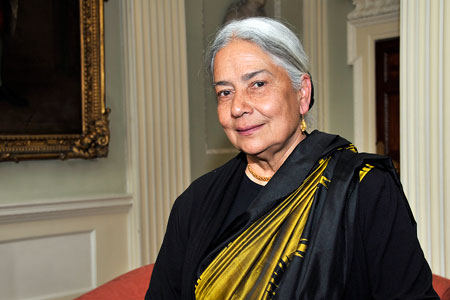Renowned Indian Author Anita Desai Speaks at TCD
Posted on: 09 April 2008
The renowned Indian author, Anita Desai, delivered the Hely-Hutchinson Memorial lecture in the Edmund Burke Theatre, Trinity College Dublin on Tuesday, April 8, 2008 last. The author spoke on multilingualism in her lecture, ‘Let Us be Various’ which was hosted by TCD’s School of Languages, Literatures and Cultural Studies. The event which attracted up to 250 people, including students, staff, graduates, as well as members of the public and writing community was chaired by Professor Cormac Ó Cuilleanáin.
The Hely-Hutchinson Lecture is held every few years to commemorate John Hely-Hutchinson, Provost 1774-94, who introduced two Chairs of Modern Languages in Trinity College in 1776 – the first of their kind at any university in the world. The 2008 Lecture is the ninth in the series and was attended by present-day descendants of Provost Hely-Hutchinson.
Anita Desai, who has been described as India’s finest writer in English is a novelist, short-story writer and children’s author. Among her works are Fasting, Feasting (1999), Baumgartner’s Bombay (1987), and The Zigzag Way (2004), all of which draw fascinating parallels between lives lived in different cultures, from Germany to India, from Cornwall to Mexico. Her 1984 novel, In Custody, was made into a film by Merchant Ivory productions. Her 1982 children’s book, The Village by the Sea, won the Guardian Children’s Fiction Prize. She has won numerous literary awards and was three times shortlisted for the Booker Prize; in 2006, the Booker was won by her daughter Kiran Desai.
Anita Desai divides her time these days between India, the United States and Mexico. She has held fellowships at two Cambridge colleges, and is Emeritus Professor of Writing at the Massachusetts Institute of Technology.
On the act of writing, the author herself is quoted as saying: “I have been writing, since the age of 7, as instinctively as I breathe. It is a necessity to me: I find it is in the process of writing that I am able to think, to feel, and to realise at the highest pitch. Writing is to me a process of discovering the truth…. My novels are no reflection of Indian society, politics, or character. They are part of my private effort to seize upon the raw material of life -its shapelessness, its meaninglessness, that lack of design that drives one to despair-and to mould it and impose on it a design, a certain composition and order that pleases me as an artist and also as a human being who longs for order.”
The lecture was organised by the School of Languages, Literatures and Cultural Studies at Trinity College Dublin. The School comprises six Departments – French, Germanic Studies, Hispanic Studies, Irish & Celtic Languages, Italian, Russian & Slavonic Studies and the Centre for European Studies. It is currently expanding its range of postgraduate courses, the latest addition being an MPhil in Comparative Literature.

